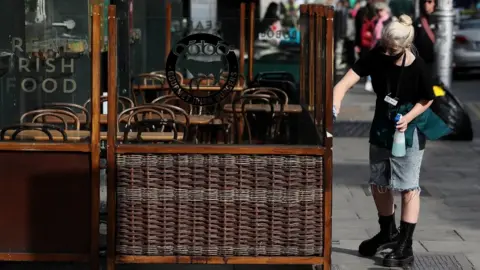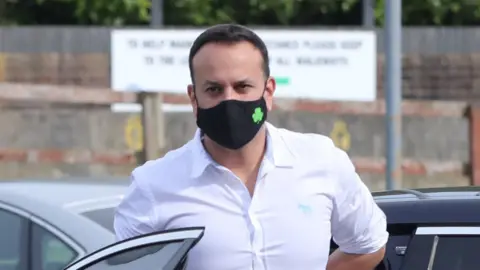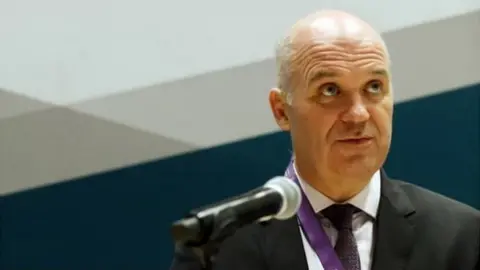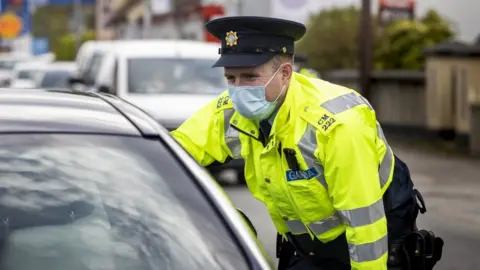Coronavirus: Row over level of Irish restrictions
 Brian Lawless/PA
Brian Lawless/PAFor the first time since the Covid-19 pandemic began, the Irish government has rejected advice from its public health officials about the necessary level of restrictions because of the rising number of new cases.
Comments from the Tánaiste (deputy prime minister) Leo Varadkar justifying that decision have laid bare the gulf between the two sides.
On Monday morning many people in the Republic of Ireland woke up saying they had a sleepless night.
Just before going to bed they watched the RTÉ television news and learned from a leak the National Public Health Emergency Team (NPHET) had recommended the country should move up several stages in its plan of living with Covid and move to a situation more or less close to the March and April lockdown, but with schools and crèches remaining open.
It didn't take long for representatives of small businesses and politicians to vent their opposition.
All Monday morning, there were private briefings that ministers in the three-party coalition government weren't impressed that they believed that a leak from NPHET was designed to bounce them into locking down the state.
 PA Media
PA MediaThey had no idea that such a development was thought likely as there had been no indication from the public health officials that they were minded to impose further restrictions.
Many politicians and their officials wondered whether NPHET's sudden advice was linked to the return of Dr Tony Holohan, who has widespread popular support, to the role of chief medical officer after a period off work taking care of his wife.
On Monday night Mr Varadkar, who has a reputation for telling it as it is, went on RTÉ television and did not hold back.
Mr Varadkar said the public health advice "hadn't been thought through" and "came out of the blue".
No member of NPHET, he added, faced getting the pandemic unemployment payment or would have to tell someone they were losing their job.

He said the government had to look at wider social issues such as the rate of unemployment, the tens of thousands of businesses that may never open again, social isolation and mental health issues.
He continued that NPHET's assessment that hospitals were facing the immediate possibility of being overwhelmed wasn't shared by the Health Service Executive, the Republic of Ireland's equivalent of the NHS.
He concluded by saying he had full confidence in the chief medical officer and in NPHET "to dispense public health advice".
All Tuesday morning, government ministers have been telling reporters and presenters the public health officials were right to warn about the rising number of Covid-19 cases, but now was not the time to move to level five - the highest stage - of its plan.
One further death was recorded in the Republic of Ireland, taking the country's total number of deaths linked to coronavirus to 1,811.
There were also 432 new confirmed cases and 150 people are currently in intensive care.
 Liam McBurney/PA
Liam McBurney/PADr Holohan and NPHET have yet to give their reaction to the rejection of their recommendation and Mr Varadkar's comments.
The main opposition party Sinn Féin with some reservation says it supports the decision not to go to level five but said Mr Varadkar's comments "were a distraction".
The left-wing People Before Profit group is the only party to fully support the NPHET recommendation.
In rejecting the advice from public health officials, ministers know they are taking a gamble.
They have raised the level of restrictions and people are being asked:
- not to travel outside of their county except for essential purposes
- to work from home wherever possible
- only to use public transport if it's necessary to do so and
- pubs and restaurants are in effect being asked to close unless they can serve a maximum of 15 people outdoors, although takeaways and home deliveries are allowed.
Whether that gamble pays off will be measured in the coming weeks in terms of new Covid-19 cases, deaths and the numbers in hospital and in intensive care.
Much more than reputations are at stake.
'Major policing operation'
Meanwhile gardaí (Irish police) have announced a major operation to encourage the public to comply with the new restrictions will begin at midnight on Tuesday.
Operation Fanacht was first introduced in the run up to the Easter holidays and again during bank holiday weekends over the summer.
Commissioner Drew Harris said "travelling by road from tomorrow will be different from travelling today".
He said: "An Garda Síochána's priority is keeping people safe. This will be a major policing operation across the country with high visibility of Garda members to support public health measures."
People should not leave their county, he added, except for "essential purposes".
About 130 checkpoints will be in place on the country's main arterial routes while the operation will also include the deployment of thousands of mobile checkpoints.
